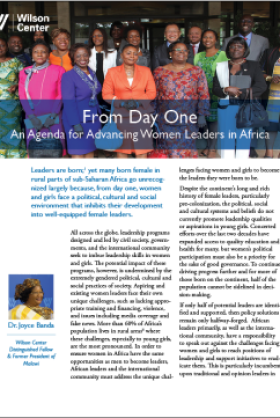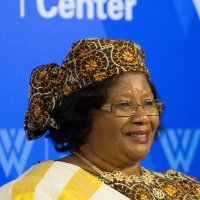From Day One: An Agenda for Advancing Women Leaders in Africa


Leaders are born; yet many born female in rural parts of sub-Saharan Africa go unrecognized largely because, from day one, women and girls face a political, cultural and social environment that inhibits their development into well-equipped female leaders.
All across the globe, leadership programs designed and led by civil society, governments, and the international community seek to imbue leadership skills in women and girls. The potential impact of these programs, however, is undermined by the extremely gendered political, cultural and social practices of society. Aspiring and existing women leaders face their own unique challenges, such as lacking appropriate training and financing, violence, and issues including media coverage and fake news. More than 60% of Africa’s population lives in rural areas where these challenges, especially to young girls, are the most pronounced. In order to ensure women in Africa have the same opportunities as men to become leaders, African leaders and the international community must address the unique challenges facing women and girls to become the leaders they were born to be.
Despite the continent’s long and rich history of female leaders, particularly pre-colonization, the political, social and cultural systems and beliefs do not currently promote leadership qualities or aspirations in young girls. Concerted efforts over the last two decades have expanded access to quality education and health for many, but women’s political participation must also be a priority for the sake of good governance. To continue driving progress further and for more of those born on the continent, half of the population cannot be sidelined in decision-making.
If only half of potential leaders are identified and supported, then policy solutions remain only halfway-forged. African leaders primarily, as well as the international community, have a responsibility to speak out against the challenges facing women and girls to reach positions of leadership and support initiatives to eradicate them. This is particularly incumbent upon traditional and opinion leaders in the community, who must lend their voice and authority to the promotion of new traditions that ensure that every child in Africa, boy or girl, is socialized in a way that encourages them to become the leaders they were born to be.
This paper seeks to address the ways in which the girls and women who are born to be leaders are prevented from reaching their potential in sub-Saharan Africa, and proposes recommendations to ensure that more African women are represented in leadership and decision-making in government and elected office across the continent. Women’s political empowerment is vital to make good on the promise to implement the Beijing International Platform for Action of 1995, and the more recent commitment made by all 54 countries in Africa to achieve the Sustainable Development Goals. Beyond that, gender parity in decision-making is critical for the sake of economic development, good governance, and peace and prosperity on the continent overall.
From Day One by The Wilson Center on Scribd
Author

Former President of Malawi

Global Women's Leadership Initiative
The Global Women’s Leadership Initiative has hosted the Women in Public Service Project at the Wilson Center since June, 2012. The Women in Public Service Project will accelerate global progress towards women’s equal participation in policy and political leadership to create more dynamic and inclusive institutions that leverage the full potential of the world’s population to change the way global solutions are forged. Read more




